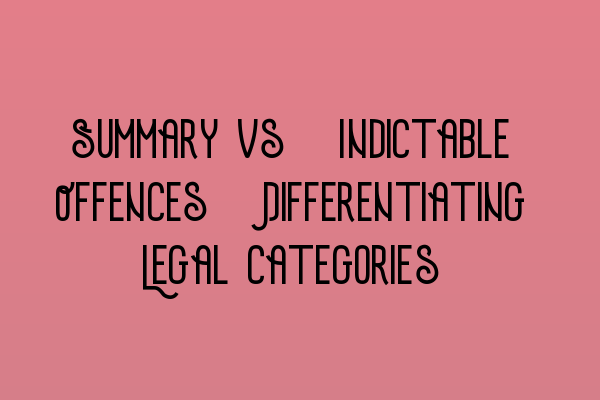Summary vs. Indictable Offences: Differentiating Legal Categories
When it comes to criminal law, understanding the different categories of offences is crucial. Two common categories that are often discussed are summary offences and indictable offences. While both fall under the umbrella of criminal law, they have distinct characteristics and implications. In this article, we will delve deeper into the differences between summary and indictable offences.
Summary Offences
Summary offences, also known as minor offences or petty crimes, are those that are less serious in nature and are typically heard in a Magistrates’ Court. These offences do not carry severe penalties and are usually less complex in terms of legal procedures and evidence requirements.
Examples of summary offences include minor assaults, simple cases of theft, public order offences, and driving offences such as speeding or driving without insurance. These offences are generally associated with less severe penalties, such as fines, community service, or short-term imprisonment.
If you are preparing for the SQE 1 exam, you may want to test your knowledge with SQE 1 Practice Exam Questions to ensure you have a thorough understanding of summary offences.
Indictable Offences
On the other hand, indictable offences are considered more serious crimes and are typically tried in the Crown Court before a judge and jury. These offences may include murder, sexual offences, serious fraud, and other complex criminal activities that carry significant penalties.
Indictable offences require more detailed legal procedures and extensive evidence gathering. The involvement of a jury ensures that the decision-making process is fair and impartial. The penalties for indictable offences can range from lengthy custodial sentences to fines and community orders.
To excel in your SQE 1 preparation, it is essential to take advantage of SQE 1 Practice Mocks FLK1 FLK2 to familiarize yourself with various scenarios related to indictable offences.
Hybrid Offences
While summary and indictable offences represent two distinct categories, it’s important to note that some offences can fall into both categories. These hybrid offences, also known as either-way offences, can be tried either in the Magistrates’ Court or the Crown Court, depending on their seriousness and other factors.
Examples of hybrid offences include theft over a certain value, burglary, and possession of controlled substances. The decision on which court will hear the case is usually made based on the seriousness of the offence and the defendant’s criminal history.
Conclusion
To succeed in the field of criminal law, it is crucial to have a solid understanding of the different categories of offences. Summary offences, with their less serious nature, are typically heard in the Magistrates’ Court and carry relatively lighter penalties. Indictable offences, on the other hand, are more serious crimes and are tried in the Crown Court with potentially severe consequences.
Whether you are preparing for the SQE 1 or SQE 2 exams, it is important to have access to reliable preparation resources. Make sure to explore SQE 2 Preparation Courses and SQE 1 Preparation Courses to enhance your knowledge and increase your chances of success.
Stay updated with the latest SRA SQE exam dates by visiting SRA SQE Exam Dates.
